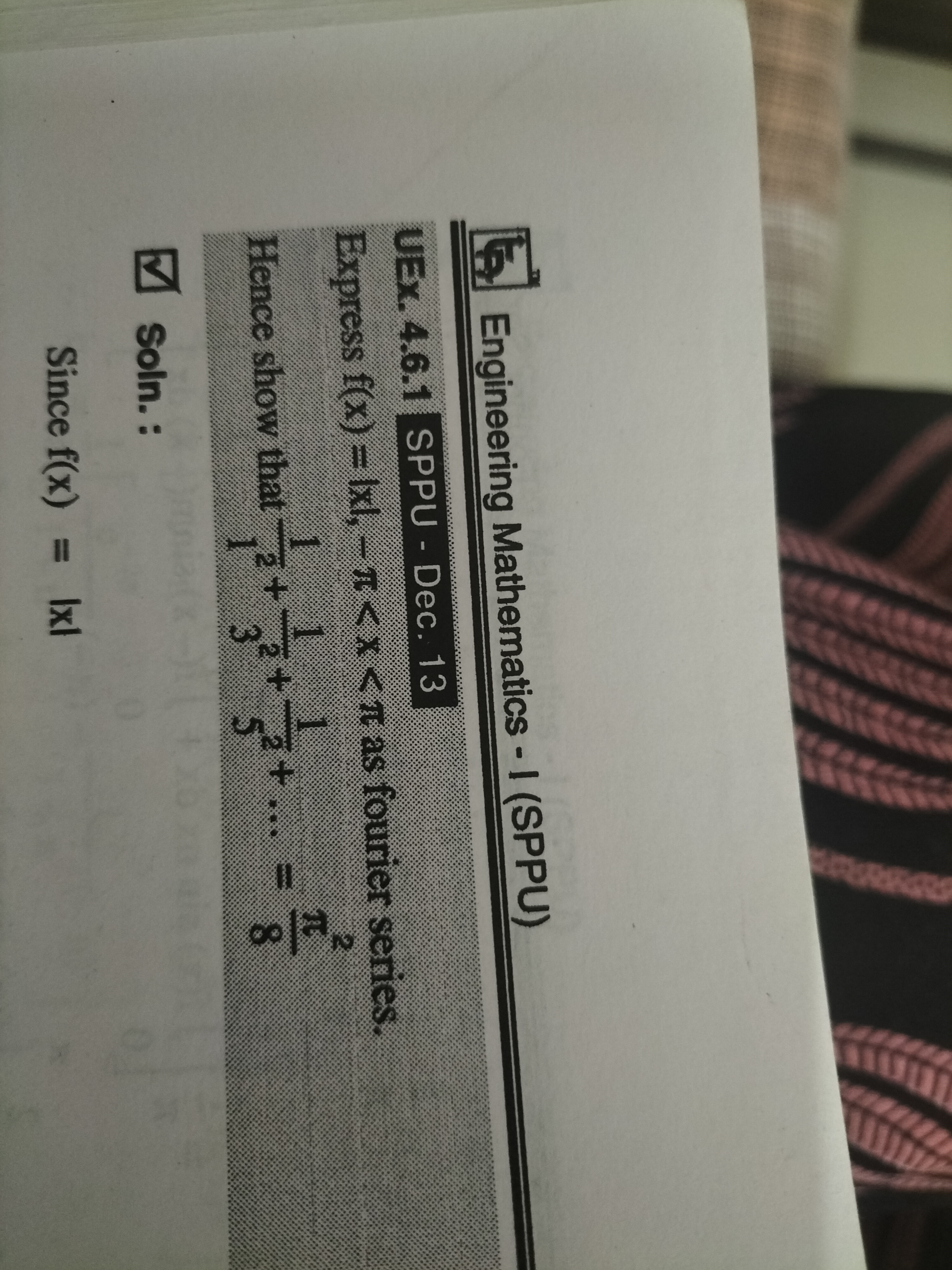Express f(x) = |x| - π for |x| < π as Fourier series. Hence show that 1 + 1/3 + 1/5 + ... = 1/8.

Understand the Problem
The question is asking to express f(x) as a Fourier series for the interval where |x| < π, and then show that the series converges to the given value. This involves applying Fourier series concepts to derive a mathematical expression and demonstrate its validity.
Answer
The Fourier series for \( f(x) = |x| \) is $$ f(x) \sim \frac{\pi}{2} + \sum_{n=1}^{\infty} a_n \cos(nx) $$ and converges to \( \frac{\pi^2}{8} \).
Answer for screen readers
The Fourier series for ( f(x) = |x| ) on ( -\pi < x < \pi ) is:
$$ f(x) \sim \frac{\pi}{2} + \sum_{n=1}^{\infty} \left( a_n \cos(nx) \right) $$
It converges to the value ( \frac{1}{4} + \frac{1}{9} + \frac{1}{16} + \ldots = \frac{\pi^2}{8} ).
Steps to Solve
-
Define the function and its interval The function ( f(x) = |x| ) is given on the interval ( -\pi < x < \pi ).
-
Calculate the Fourier coefficients We need to calculate the Fourier coefficients ( a_n ) and ( b_n ). The formulas for the coefficients are:
$$ a_0 = \frac{1}{2\pi} \int_{-\pi}^{\pi} f(x) , dx $$
$$ a_n = \frac{1}{\pi} \int_{-\pi}^{\pi} f(x) \cos(nx) , dx $$
$$ b_n = \frac{1}{\pi} \int_{-\pi}^{\pi} f(x) \sin(nx) , dx $$
-
Calculate ( a_0 ) First, calculate the average of the function:
$$ a_0 = \frac{1}{2\pi} \int_{-\pi}^{\pi} |x| , dx $$ Given ( |x| ) is an even function, we can simplify it as: $$ a_0 = \frac{1}{2\pi} \cdot 2 \int_{0}^{\pi} x , dx = \frac{1}{\pi} \left[ \frac{x^2}{2} \right]_{0}^{\pi} = \frac{\pi^2}{2\pi} = \frac{\pi}{2} $$
-
Calculate ( a_n ) Now calculate ( a_n ):
$$ a_n = \frac{1}{\pi} \int_{-\pi}^{\pi} |x| \cos(nx) , dx = \frac{2}{\pi} \int_{0}^{\pi} x \cos(nx) , dx $$ Use integration by parts: Let ( u = x ) and ( dv = \cos(nx) , dx ).
-
Calculate ( b_n ) Now calculate ( b_n ):
$$ b_n = \frac{1}{\pi} \int_{-\pi}^{\pi} |x| \sin(nx) , dx $$ Again due to the properties of sine and symmetry: $$ b_n = \frac{2}{\pi} \int_{0}^{\pi} x \sin(nx) , dx $$
-
Construct the Fourier series The Fourier series can be expressed as:
$$ f(x) \sim a_0 + \sum_{n=1}^{\infty} (a_n \cos(nx) + b_n \sin(nx)) $$
-
Show the convergence To show that the series converges to a specific value (e.g., (\frac{1}{4} + \frac{1}{9} + \frac{1}{16} + \ldots = \frac{\pi^2}{8})), we recognize it resembles the series of the Fourier expansion evaluated at ( x = 0 ). Thus, using the properties of Fourier series convergence.
The Fourier series for ( f(x) = |x| ) on ( -\pi < x < \pi ) is:
$$ f(x) \sim \frac{\pi}{2} + \sum_{n=1}^{\infty} \left( a_n \cos(nx) \right) $$
It converges to the value ( \frac{1}{4} + \frac{1}{9} + \frac{1}{16} + \ldots = \frac{\pi^2}{8} ).
More Information
The Fourier series decomposes periodic functions into sums of sine and cosine terms, revealing important frequency components. The series converges to the value of the function at points of continuity and to the average value at points of discontinuity.
Tips
- Not considering symmetry: Ignoring that ( |x| ) is even can lead to incorrect coefficients.
- Misapplying integration by parts: Mistakenly using limits or misidentifying ( u ) and ( dv ).
AI-generated content may contain errors. Please verify critical information